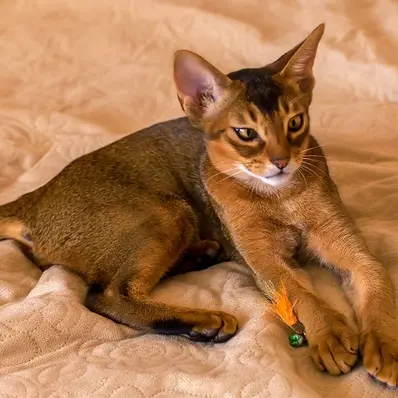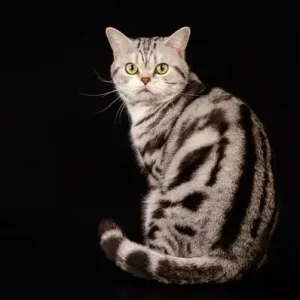History and Origin of The Abyssinian Cat
The Abyssinian cat breed has a rich history that can be traced back to ancient times. Genetic studies suggest that parts of Southeast Asia or the coasts of the Indian Ocean might be their possible origins.
However, the name “Abyssinian” is derived from their striking resemblance to the mummified cats of Egypt and the felines portrayed in ancient Egyptian art dating back 4000 years. Another intriguing theory suggests that one Abyssinian cat might have been brought from Egypt.
In 1868, an English General returning from the Abyssinian war brought this extraordinary breed to England. The Abyssinian cat he brought, named Zula, not only marked the introduction of the breed to the Western world but also made history by winning the first prize at the Crystal Palace cat show.
Despite their ancient roots, Abyssinians faced a perilous period during World War II when a feline virus spread through the UK, endangering the breed. This challenging time tested the resilience of Abyssinians, but dedicated efforts helped revive their population.
The first Abyssinians arrived in North America in the early 1900s, but their popularity didn’t surge until the 1930s. Today, the Abyssinian holds a place of honor among cat breeds.
Recognized by both the Cat Fanciers Association and The International Cat Association, the Aby consistently ranks among the top five most popular breeds. It is a testament to its enduring charm and appeal.
Personality
If you’re thinking of getting an Abyssinian cat, you’re in for a treat! These cats are super smart and love to play. They’re always curious and full of energy, so you’ll never be bored with them around. In fact, these don’t do well as lap cats and would rather prefer to be jumping around in cat trees.
They’re also really friendly and love to be around people, being very extroverted in nature. They’re great with kids and adults alike, so they make perfect family pets. And since they love to socialize, they’ll bond wonderfully with other cats as well.
If you want to keep them happy, make sure they have plenty of toys and things to play with. They also like to go outside, so if you have a secure outdoor space, they’ll love it.
And don’t worry if you need to leave them alone for a few hours – they’re independent enough to handle it. Whether you live in a quiet home or a busy one, an Abyssinian cat will fit right in!
Physical Appearance
The Abyssinian cat’s physical appearance is a testament to its elegance and unique features that set it apart within the feline world.
The Abyssinian’s head is wedge-shaped, contributing to its sleek and refined appearance. The wedge shape is complemented by expressive almond-shaped eyes that radiate intelligence and curiosity.
- Size
Abyssinian is a medium-sized cat boasting long, lean, and muscular bodies supported by fine-boned, elongated legs. This breed showcases a graceful physique, giving it a regal and athletic presence.
An average Abyssinian cat weighs around 8 to 10 pounds, while an Abyssinian kitten weighs around 3 to 4 pounds.
- Coat Color
One of the most distinctive features of the Abyssinian is its stunning coat color. The coat sports a mesmerizing, ruddy, red, or blue ticked coat with bands of color, creating a visual spectacle. These coat patterns on the individual hair shafts result in a coat with a translucent quality.
Gender Differences
Abyssinian cats have different personalities depending on their gender. Male Abyssinians are super friendly and love to play with their owners. They’re always seeking attention and love to form strong bonds with their humans.
On the other hand, female Abyssinians are more independent and prefer to be left alone sometimes. They still enjoy socializing, but only when they’re in the mood for it. Males are also slightly longer and have a stronger build, which makes them more playful and energetic.
Feed/Nutrition
Abyssinian cats need a healthy and balanced diet to stay healthy and happy. They require high-quality cat food that is appropriate for their age and activity level.
Since Abyssinians are playful and energetic, they need a diet rich in essential nutrients to support their overall health. It’s important to consult with your veterinarian to determine the right feeding schedule and portion sizes to maintain a healthy weight and prevent potential health issues.
Also, make sure to provide fresh water at all times to keep your Abyssinian hydrated. A well-fed and hydrated Abyssinian is a happy cat that is likely to lead a long and healthy life.
Health Problems
Abyssinian cats, like any other breed, may be susceptible to certain health issues. Understanding these potential concerns is crucial for proactive and preventive care.
- Pyruvate Kinase Deficiency: One health issue that Abyssinians may face is Pyruvate Kinase Deficiency (PKD), a hereditary condition that affects red blood cell function. Regular veterinary check-ups, genetic testing, and a well-balanced diet can contribute to managing and mitigating the impact of PKD.
- Gingivitis: Gingivitis, inflammation of the gums, is another common health concern in Abyssinians. This breed may be prone to dental issues, making dental care an essential aspect of their overall well-being. Regular brushing, dental treats, and professional dental cleanings can help prevent and manage gingivitis.
- Renal Failure: Abyssinians may also be predisposed to renal failure. Monitoring their kidney health through routine veterinary examinations and providing a kidney-friendly diet can aid in the early detection and management of renal issues.
Care and Grooming
The Abyssinian cat, blessed with a clean and short coat, requires minimal grooming, making it an ideal choice for those seeking a low-maintenance feline companion.
A weekly check-over and a gentle polish with a bristle brush are typically sufficient to keep their coat in optimal condition.
Any signs of a greasy or scurfy coat can be early indicators of underlying health issues, and regular grooming allows for prompt identification. As with all cats, establishing a routine for vaccinations and parasite control is essential.
Engaging in regular discussions with your veterinarian about your Abyssinian’s specific needs ensures a comprehensive and tailored approach to their overall well-being.
Rescue Groups
Consider adopting an Abyssinian from a reputable rescue group. They often have cats in need of loving homes.
Breed for Sale
If you decide to purchase an Abyssinian, ensure you choose a reputable Abyssinian cat breeder who prioritizes the health and well-being of their cats. Here are some sources for buying an Abyssinian cat:
Interesting Facts
- In 1868, an Abyssinian named Zula, brought from the Abyssinian war, won first prize in a cat show at the Crystal Palace in England, marking the breed’s introduction to the Western world.
- Abyssinians faced endangerment during World War II due to a feline virus in the UK. Dedicated efforts helped revive the breed, showcasing its resilience.
Best For
Abyssinians make excellent companions for active individuals or families. Their playful nature makes them great for interactive play.
Top Names
| Male Abyssinian cat Names | Female Abyssinian cat Names |
| Leo | Luna |
| Milo | Cleo |
| Oliver | Nala |
| Felix | Maya |
| Atlas | Stella |










